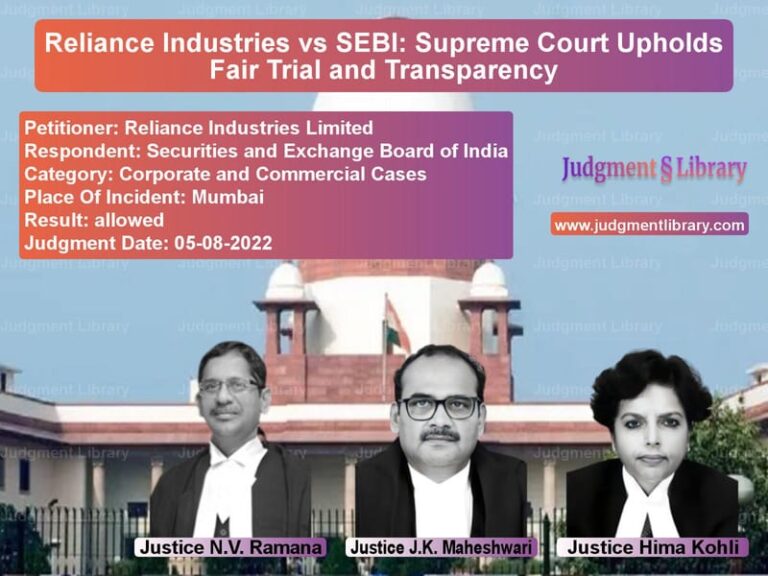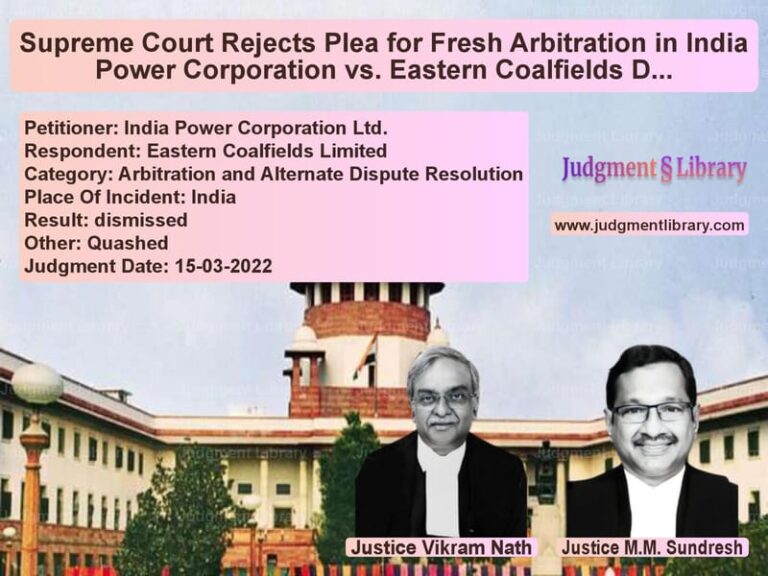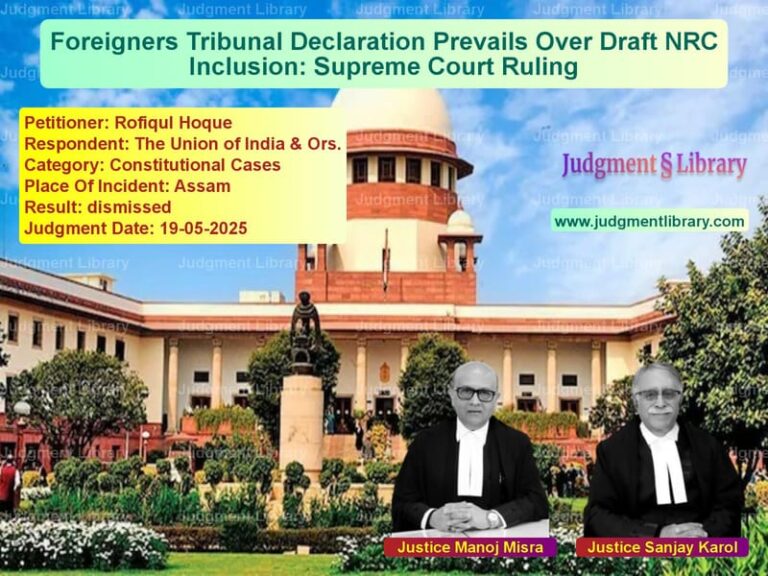Delhi University Pension Dispute: Supreme Court Rules on CPF to GPF Transition
The Supreme Court of India recently ruled in University of Delhi vs. Smt. Shashi Kiran & Others, a landmark case addressing the long-standing dispute regarding the transition of Delhi University employees from the Contributory Provident Fund (CPF) to the General Provident Fund (GPF) and pension scheme. The key question before the Court was whether employees who had earlier opted for CPF should be given another opportunity to switch to the pension scheme, given the financial disadvantages they faced over time.
Background of the Case
Delhi University employees were initially covered under the CPF scheme, which involved direct employer-employee contributions without post-retirement benefits. However, in 1987, the government introduced the GPF and pension scheme, which allowed employees to receive lifelong pensions post-retirement. Employees were given an option to switch from CPF to GPF within a stipulated period.
The dispute arose when some employees who had opted for CPF realized that they were at a financial disadvantage compared to their colleagues who had chosen GPF. While GPF beneficiaries received periodic pension increments, CPF beneficiaries only received a lump-sum amount without long-term benefits.
The employees argued that they should be allowed another opportunity to shift to GPF to secure their financial future. Delhi University, however, refused to grant this request, citing financial constraints and policy limitations.
Petitioners’ Arguments
The petitioners, who were employees of Delhi University, argued:
- Employees who failed to opt for CPF by the original deadline should be deemed to have opted for GPF as per the government notification dated 01.05.1987.
- Many other universities and public institutions had permitted similar transitions, and denying the same to Delhi University employees was discriminatory.
- The economic impact of remaining in the CPF scheme was significant, as pensioners received lifelong benefits, while CPF beneficiaries were left without financial security.
- Delhi University had already allowed some employees to switch in previous rounds, so further opportunities should be extended to all similarly situated employees.
- The refusal to permit a transition violated the fundamental rights of the employees under Article 14 (Right to Equality) of the Constitution of India.
Respondents’ Arguments
Delhi University and the University Grants Commission (UGC) opposed the petition, stating:
- The deadline for switching from CPF to GPF had been extended multiple times, and further extensions would create administrative challenges.
- The financial burden on the university and government would be substantial if such a transition were permitted.
- The affected employees had voluntarily opted for CPF, and once an option was exercised, it could not be revoked retrospectively.
- Policies governing pension schemes must be applied consistently, and permitting unlimited transitions would disrupt the financial planning of the university.
Supreme Court’s Observations
The Supreme Court carefully examined past cases related to similar pension disputes, including:
- V.K. Sood vs. Secretary, Ministry of Civil Aviation (1993): This case held that government employees who had opted for CPF could not be arbitrarily denied an opportunity to switch to GPF.
- D.S. Nakara vs. Union of India (1983): The Court ruled that pension schemes must be applied equitably and should not create undue disadvantages for a particular class of employees.
- All India Judges Association vs. Union of India (2002): This judgment established that pension benefits should be interpreted in a manner that upholds the dignity of retirees.
The Supreme Court made the following key observations:
- Delhi University’s refusal to allow employees to transition to GPF while permitting others to do so in the past was arbitrary and violated Article 14 of the Constitution.
- Many government institutions had provided similar transition opportunities, so restricting it in this case created an unreasonable classification.
- The financial burden argument was not a sufficient ground to deny fundamental benefits to employees who had contributed to the system for decades.
- Retirement benefits must be structured in a way that ensures financial security for employees in their post-retirement years.
The Court stated:
“The policy must be applied uniformly across all employees, and an arbitrary distinction cannot be made between similarly placed individuals.”
Judgment and Directions
- The Supreme Court ruled that all Delhi University employees who had not opted for CPF by the original deadline should be considered under GPF.
- Employees who had opted for CPF but later realized their financial disadvantage should be granted another opportunity to switch.
- Delhi University was directed to allow affected employees to transition to the pension scheme, provided they returned their CPF contributions with interest.
- The university must implement the order within three months.
- Retirement benefits, including pension and gratuity, must be paid to affected employees in accordance with the GPF rules.
Key Takeaways from the Judgment
- The Supreme Court reaffirmed the principle that pension schemes must be administered equitably.
- The ruling prevents discrimination among employees who were denied transition opportunities in the past.
- The decision sets a precedent for other public institutions facing similar pension disputes.
- The judgment ensures financial security for affected employees in their post-retirement years.
Implications of the Judgment
The ruling has far-reaching consequences for pension scheme administration in India. Key implications include:
- Uniformity in Pension Policies: The judgment ensures that all employees are treated fairly under pension regulations.
- Precedent for Other Institutions: Other universities and public institutions with similar pension disputes may now be required to follow this ruling.
- Judicial Oversight on Pension Rights: The decision reinforces that courts will intervene when pension policies create unreasonable disadvantages for employees.
Conclusion
The Supreme Court’s ruling in University of Delhi vs. Smt. Shashi Kiran & Others is a landmark decision that upholds the rights of government employees in pension matters. By allowing affected employees another opportunity to switch from CPF to GPF, the Court has ensured that retirement benefits remain equitable and fair. This judgment sets a precedent for future cases involving pension disputes, reinforcing the importance of providing financial security to retired employees.
Petitioner Name: University of Delhi.Respondent Name: Smt. Shashi Kiran & Others.Judgment By: Justice Uday Umesh Lalit, Justice Vineet Saran.Place Of Incident: Delhi.Judgment Date: 10-05-2022.
Don’t miss out on the full details! Download the complete judgment in PDF format below and gain valuable insights instantly!
Download Judgment: university-of-delhi-vs-smt.-shashi-kiran-&-supreme-court-of-india-judgment-dated-10-05-2022.pdf
Directly Download Judgment: Directly download this Judgment
See all petitions in Pension and Gratuity
See all petitions in Employment Disputes
See all petitions in Judgment by Uday Umesh Lalit
See all petitions in Judgment by Vineet Saran
See all petitions in allowed
See all petitions in supreme court of India judgments May 2022
See all petitions in 2022 judgments
See all posts in Service Matters Category
See all allowed petitions in Service Matters Category
See all Dismissed petitions in Service Matters Category
See all partially allowed petitions in Service Matters Category







